4,339 Results
Advocating for Honest History Education
Parent and caregiver advocacy is crucial as children’s right to inclusive learning and honest history education is being limited in some states and communities. While the media often highlights the vocal efforts of a few politically motivated parents’ groups to censor teaching and to exclude some children and families from representation, we know that most parents and caregivers support fair and inclusive education practices that protect the learning and well-being of all children.
- Advocating for Honest History Education: A Resource for Parents and Caregivers
- Advocating for Teaching Honest History: What Educators Can Do
Freedom To Read, Freedom To Learn
May 3 is the Freedom To Learn National Day of Action, a day of advocacy for inclusive education and young people’s freedom to read, learn and build a just future. Our collective responsibility is to counter disinformation, uplift honest history and engage our communities to serve all children.
- Freedom To Read, Freedom To Learn
- Exclusion Is Unconstitutional
- A Call for Anti-Bias Education
Eat, My Fine Coat!

Accepting Change Because My Students Accepted First

The Claims of the Negro, Ethnologically Considered
FREEDOM TO LEARN NATIONAL DAY OF ACTION—MAY 3, 2023
“Because we know that attacks on knowledge are fueling threats to freedom, and that repression in one place fuels its spread elsewhere, we call for global resistance to all efforts to destroy the vital tools that help us to imagine and create more equitable and inclusive futures for us all.” —African American Policy Forum
- Freedom To Read, Freedom To Learn
- Debbie Reese on Book Bans and Native Representation
- ‘Never Again’ Starts With Education
Why Civics Education Needs Social Justice
From an early age, each of us must navigate numerous social institutions, many of which were designed to perpetuate centuries-old inequities. For us to move in those spaces with power and agency, civic knowledge, skills and dispositions are essential. But alarming trends reveal a sharp decline in civics competency among adults in the United States, and participation in places that bring people together to solve common problems has withered, too. Civics education needs a critical social justice lens so people can fulfill the potential of a multiracial and inclusive democracy.
- Why Civics Needs Social Justice Education
- What Is Social Justice Education?
- Social Justice Standards
Painting a Just Picture: Art and Activism

